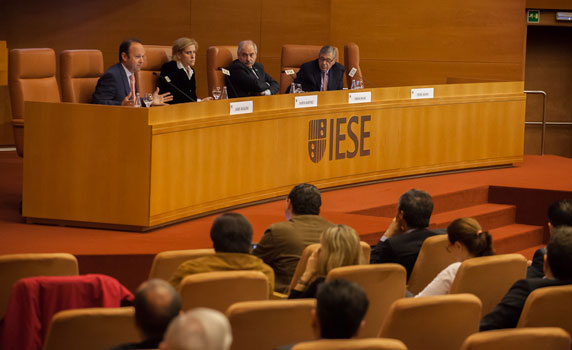
"Leadership and, above all, confidence are necessary conditions for exiting the crisis", said Jaime Aguilera, president of Unilever Spain, during the Continuous Education session, "Creating the Company of 2020 and its Context," held on the Barcelona campus and organized by IESE’s Alumni Association. "If we don’t have confidence in the future, how can we convey it?" he asked.
The session, divided into two panel discussions, was opened by IESE Dean Jordi Canals, who stressed the importance of doing "what is characteristic of business leaders," which is focusing on the long term. He reminded the audience that companies will be the players to eventually lead the way out of the crisis.
The Vision of Companies
During a panel discussion focused on the perspective of businesses and moderated by Prof. Pedro Nueno, Marta Martínez, president of IBM for Spain, Portugal, Greece and Israel, highlighted the importance of technology now and in the future.
"It is an essential element for transforming business models," she said. "According to surveys, CEOs rank it number one among elements that will define the future of their companies, when six years ago they placed it in sixth place."
In addressing an exit from the crisis, Martínez, an IESE graduate, said: "We have successful cases and we should promote these. Sometimes we sell badly what we do well."
Innovation and creativity are critical for a successful recovery, said Aguilera, adding that greater competitiveness is also vital for boosting consumption. This applies beyond the private sector, he said, to the public sector and on an individual level.
Erwin Rauhe, vice president of BASF Spain, said that "over the next few months, there will be more opportunities for growth in Southern Europe than in Northern Europe. We must analyze how to sell not only products but solutions; to do the same things but more efficiently, using fewer resources," he said.
The Vision of Academics
IESE Prof. Antonio Argandoña moderated a panel that included faculty members Alfredo Pastor, Pedro Videla and Xavier Vives. Recovery in Europe "has already started," said Videla, in the wake of adjustments in the public and private sector, sanitation of the banks and consolidation of the euro. In spite of everything, "we have to be aware that the recovery will be slow, since there are not adjustment mechanisms with a single currency."
He compared the situation of Spain, for example, with that of a state in the U.S., such as Nevada. To confront the situation, Spain should incentivize labor mobility, improve work flexibility and fiscal policy, and – on a supranational level – promote greater banking and fiscal union, he said.
Pastor provided an overview of the situation, agreeing with the other speakers that recovery will be sluggish due to the minimal maneuvering allowed by the euro. However, social aspects of the situation should be put into perspective, since the markets will not get back on track by themselves in the short term.
Prof. Vives discussed the development of a banking union in the EU, noting that "the process toward a union is complex but has received strong support in moments of acute crisis. The goal of a transition toward a banking union that is reasonable, that functions and stabilizes the eurozone is to find a balance between moral risk and systematic risk in the policies that adapt it," he said. Prof. Argandoña closed the panel discussion with a warning: "No business sector is exempt from the responsibility of getting us out of the recession."
Read article on Prof. Antonio Argandoña’s blog.